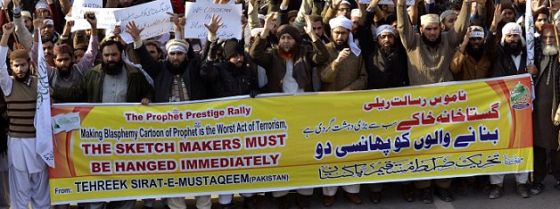Friends and family of Deah Barakat, his wife Yusor Mohammed Abu-Salha, 21, and her sister Raza Abu-Salha, have eloquently described what exceptional individuals they were and how dearly they will be missed.
It is natural and appropriate that at such a time of tragic loss, those feeling the most grief want to honor the memory of three lives so senselessly cut short.
In their own ways, each of these young people was unique and irreplaceable.
But as Muslims, were they exceptional? Probably not.
We live in a world where blowhards, attention-seekers, and those obsessed with leaving their mark, too often take center stage. Ordinary virtue gains too little acclaim. Acts of kindness that hold societies together, may be so small and commonplace as to often go unnoticed.
People like Richard Dawkins, Sam Harris, and Bill Maher, who each appear to have their own need for notoriety and who have contributed significantly to the Islamophobic currents active in North America and Europe, might care to pose themselves this simple question:
Who are more numerous? Muslims like the three who were gunned down in Chapel Hill on Tuesday, or those who flock to join the ranks of ISIS?
There are 1.6 billion Muslims. For any non-Muslim with an ounce of common sense, the answer should be obvious, yet within the febrile imagination of every Islamophobe, every single Muslim is viewed with suspicion.
Over a decade after the 9/11 attacks, Harris, bemoaning the inefficiency of security screening in American airports, wrote:
We should profile Muslims, or anyone who looks like he or she could conceivably be Muslim, and we should be honest about it…
Needless to say, a devout Muslim should be free to show up at the airport dressed like Osama bin Laden, and his wives should be free to wear burqas. But if their goal is simply to travel safely and efficiently, wouldn’t they, too, want a system that notices people like themselves?
Because I have family in the North of England, over the years I have passed through Manchester airport many times and have often amused myself by imagining how terrified Harris would be if he ever arrived there.
If through some act of lunacy, the airport authorities and airlines there decided to follow Harris’ recommendation, traffic would grind to a halt.
Manchester is every Islamophobe’s worst nightmare and yet has never distinguished itself as a hub of international terrorism.
Harris, with his polished demeanor of gravity, refers in all seriousness to people who look like jihadis, as though terrorists obligingly follow a particular dress-code and shaving style.
What he and anyone who truly values reason should understand is that anyone who practices the art of spotting Muslims, is much more likely to encounter the many Deah Barakats than a much rarer Jihadi John or an Abu Bakr al-Baghdadi.
As for the chances of having a neighbor like Craig Hicks? They’re far greater than the chances of a close encounter with the terrorists that animate the fears of too many Americans.
But then comes the question that appears in one form or another so often on Twitter — this time from Palwasha in Pakistan:
Can someone tell me the difference between these two guys? No difference, both are Terrorists #ChapelHillShooting pic.twitter.com/i16Lf9oYjp
— Shewaani ♛ (@iShewaani) February 12, 2015
If terrorist just means, worthy of contempt, then sure, both are terrorists.
But even though the term terrorist gets tossed around too freely, I don’t think it has lost all meaning. As Padraig Reidy points out:
Terrorism, as carried out by groups across the world, religious, secular or somewhere in between, tends to come with a cause, a manifesto, a list of demands. Anders Breivik, with whom Hicks will be compared, may have acted alone, but he had a manifesto; he laid out his reasons for killing, and hoped that others would follow his example. There is no evidence thus far that the North Carolina killer was hoping to inspire others, or to issue edicts, or even claim legitimacy for his actions.
As much as can be gleaned from Hicks’ Facebook page, if he had a plan, it didn’t include murdering his neighbors. Having just become certified as an auto parts dealer, it appears he intended to return to a career he had pursued for over two decades. He also seems to have been thinking about vegetable gardening in recent days.
There are numerous accounts describing Hicks’ anger. He described himself a “gun-toting” atheist. The Associated Press reports:
A woman who lives near the scene of the shootings described Hicks as short-tempered. “Anytime that I saw him or saw interaction with him or friends or anyone in the parking lot or myself, he was angry,” Samantha Maness said of Hicks. “He was very angry, anytime I saw him.”
Hicks’ ex-wife, Cynthia Hurley, said that before they divorced about 17 years ago, his favorite movie was “Falling Down,” the 1993 Michael Douglas film about a divorced unemployed engineer who goes on a shooting rampage. “That always freaked me out,” Hurley said. “He watched it incessantly. He thought it was hilarious. He had no compassion at all,” she said.
Hicks’ militant atheism which he expressed obsessively through Facebook, seems like it may have been a channel for his own rage.
Did he choose his targets because of their specific religion, simply because they were visibly religious, or because of some irresistible logic within his own anger?
Whatever his reasons, there’s almost certainly another Hicks in every American city — some angry middle-aged white man whose rage only catches wide attention when he ends up articulating it through the barrel of a gun.
And much as Harris may object to being associated with Hicks, they don’t just share the same ideology; they also seem to have a liking for the exactly the same kind of gun.
In his argument in defense of gun-ownership, Harris features a photo of a Ruger LCR revolver. Likewise, Hicks, posted a photo of his own loaded Ruger LCRx revolver on Facebook less than a month ago.
As a cultural symbol, the gun represents for many Americans something about their core identity — it is cherished as a guardian of freedom.
Yet it also represents a fusion of fear and power, weakness and strength, as it emboldens cowards.
Without his revolver, Craig Hicks would most likely have never been more than an irritating neighbor — a man whose poisonous thoughts never turned deadly.




